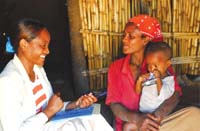Community
Health education is among the tasks that all health professionals will also be expected to implement at community level. A community can be described as a collection of people who have a feeling of belonging and share a common culture, beliefs, values and norms. In this context a community will also have a common interest regarding the possible health problems within your area.
Your community is a specific group of people, often living in a defined geographical area and arranged in a social structure according to relationships that the community has developed over a period of time. Members of a community gain their personal and social identity through shared culture, beliefs, values and norms. All health education work relies on good relationships with people in your community. Community members will also exhibit some awareness of their identity as a group, their common needs and will have a commitment to meeting these needs.

A community could be a town or a large area that is sparsely populated, it might also be the people involved with the school where you are working or a work site.
Imagine that you are a health professional who has been invited by your community administrator to deliver health messages on malaria prevention to a gathering in your village. What type of health education is this and who do you think your target audience for this message would be?
Malaria is a health issue that affects many different people in the village. A message about its prevention is part of community-level health education so your target audience will be the whole community.